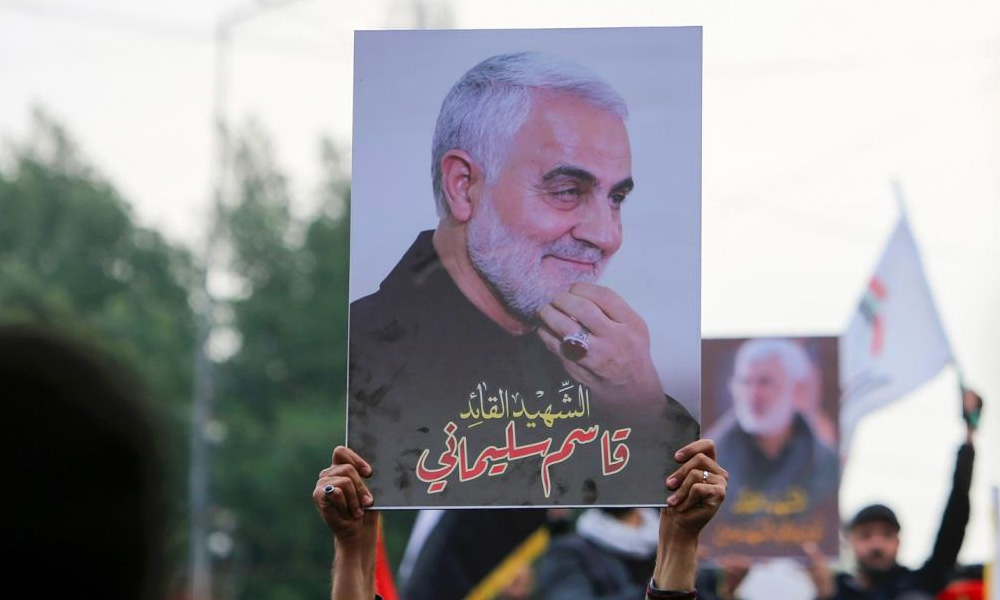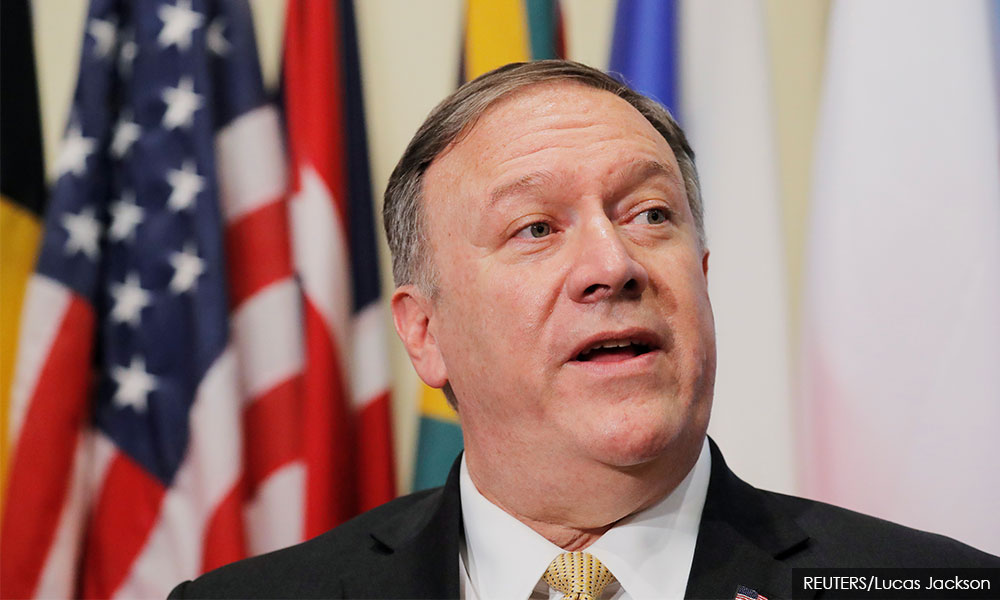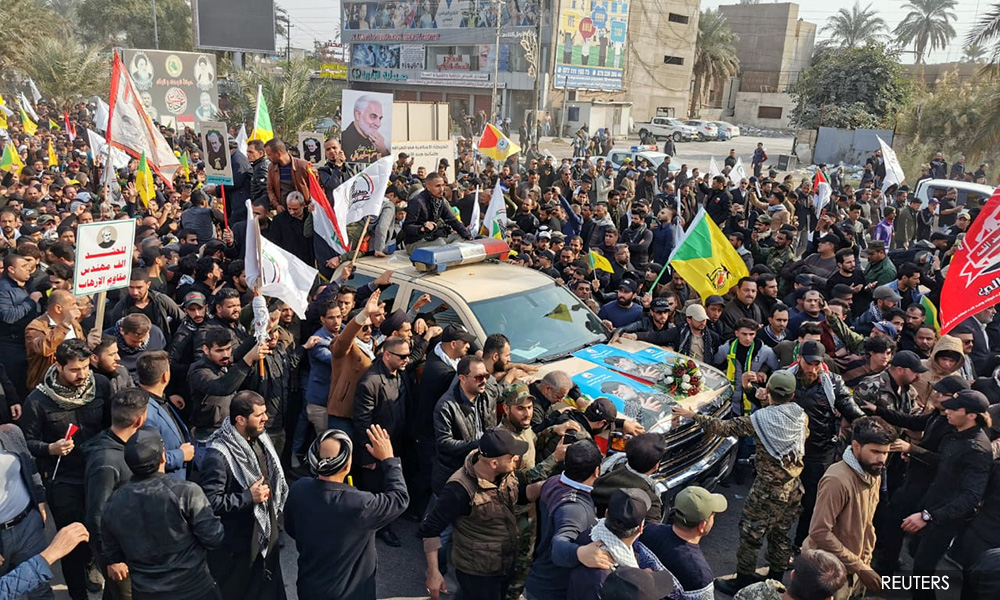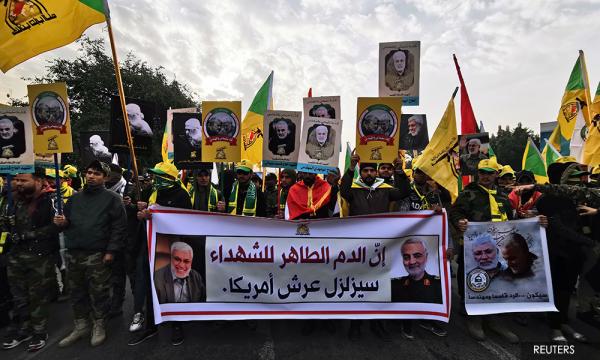- UPDATED 12.25PM: Including Trump's comments on possible US sanctions.
Iran's most prominent general, Qassem Soleimani, was killed on Friday in a US drone strike on his convoy at Baghdad airport, an attack that carried US-Iranian hostilities into uncharted waters.
An Iranian government minister denounced Trump as a "terrorist in a suit" after the US president sent a series of Twitter posts on Saturday threatening to hit 52 Iranian sites, including targets important to Iranian culture, if Tehran attacks Americans or US assets to avenge Soleimani's death.
Talking to reporters aboard Air Force One on the way to Washington from Florida on Sunday evening, Trump stood by those comments.
"They're allowed to kill our people. They're allowed to torture and maim our people. They're allowed to use roadside bombs and blow up our people. And we're not allowed to touch their cultural sites? It doesn't work that way," he said.
Democratic critics of the Republican president have said Trump was reckless in authorising the strike, and some said his comments about targeting cultural sites amounted to threats to commit war crimes.
Many asked why Soleimani, long seen as a threat by US authorities, had to be killed now?
Republicans in Congress have generally backed Trump's move.
Trump also threatened sanctions against Iraq and said that if US troops were required to leave the country, Iraq's government would have to pay Washington for the cost of a "very extraordinarily expensive" airbase there.
He said if Iraq asked US forces to leave on an unfriendly basis, "we will charge them sanctions like they've never seen before ever. It'll make Iranian sanctions look somewhat tame".
In a war of words between Iran and the US, US Secretary of State Mike Pompeo said Washington would target any Iranian decision-makers it chose if there were further attacks on US interests by Iranian forces or their proxies.
Qassem Soleimani (below) was killed last Friday in a US drone strike on his convoy at Baghdad airport, an attack that carried US-Iranian hostilities into uncharted waters and stoked concern about a major conflagration.
As Washington and Tehran, longtime foes, traded threats and counter-threats, the European Union, Britain and Oman urged them to make diplomatic efforts to defuse the crisis.
The Iraqi Parliament passed a resolution calling for an end to all foreign troop presence, reflecting the fears of many in Iraq that the strike could engulf them in another war between two bigger powers long at odds in Iraq and across the region.
"The Iraqi government must work to end the presence of any foreign troops on Iraqi soil and prohibit them from using its land, air space or water for any reason," it said.

While such resolutions are not binding on the government, this one is likely to be heeded: Prime Minister Adel Abdul Mahdi had earlier called on Parliament to end foreign troop presence as soon as possible.
The US said it was disappointed in the result.
"While we await further clarification on the legal nature and impact of today's resolution, we strongly urge Iraqi leaders to reconsider the importance of the ongoing economic and security relationship between the two countries and the continued presence of the Global Coalition to Defeat ISIS," State Department spokesperson Morgan Ortagus said in a statement, using the acronym for the Islamic State militant group.
Some 5,000 US troops remain in Iraq, most in an advisory role.
Abdul Mahdi said that despite the "internal and external difficulties" the country might face, cancelling its request for help from US-led coalition military forces "remains best for Iraq on principle and practice".
He said he had been scheduled to meet Soleimani the day he was killed, and that the general had been due to deliver an Iranian response to a message from Saudi Arabia that Abdul Mahdi had earlier passed to Tehran.
Sunni Muslim Saudi Arabia and Shi'ite Iran had been about to "reach a breakthrough over the situation in Iraq and the region", Abdul Mahdi said.
Despite decades of US-Iran enmity, Iranian-backed militia and US troops fought side by side during Iraq's 2014-17 war against Islamic State, their common enemy.
Iraqi militia leader Abu Mahdi al-Muhandis was also killed in Friday's strike.
Sunday's parliamentary resolution was passed by overwhelmingly Shi'ite lawmakers, as the special session was boycotted by most Sunni Muslim and Kurdish lawmakers.
One Sunni MP told Reuters that both groups feared that kicking out US-led forces would leave Iraq vulnerable to insurgents, undermine security and heighten the power of Iranian-backed Shi'ite militias.
In his first comments on the killing of Soleimani, British Prime Minister Boris Johnson said he would not lament the death of someone who played a leading role in actions that led to the deaths of thousands of innocent civilians and Western personnel, but that "calls for retaliation or reprisals will simply lead to more violence in the region and they are in no one's interest."
'Terrorist in a suit'
Earlier on Sunday, Iran lambasted Trump after the US president threatened to hit 52 Iranian sites, including targets important to Iranian culture, if Tehran attacks Americans or US assets in retaliation for Soleimani's death.
"Like ISIS, Like Hitler, Like Genghis! They all hate cultures. Trump is a terrorist in a suit. He will learn history very soon that NOBODY can defeat 'the Great Iranian Nation & Culture'," Information and Telecommunications Minister Mohammad Javad Azari-Jahromi wrote on Twitter.

In remarks to Fox News on Sunday, Pompeo (above) said Trump had not threatened to target Iranian cultural sites.
Soleimani masterminded Iran's clandestine and military operations abroad as head of the Revolutionary Guards' Quds Force, creating an arc of Shi'ite power with the help of proxy militias confronting the regional might of the US, Israel and Saudi Arabia.
Hundreds of thousands of mourners, many chanting, beating their chests and wailing in grief, turned out across Iran to show their respects after Soleimani's body was returned to a hero's welcome.
Pompeo rejected suggestions that the US intelligence that led to the strike on the general was thin.
"The intelligence assessment made clear that no action - allowing Soleimani to continue his plotting and his planning, his terror campaign - created more risk than taking the action that we took last week," he said on ABC's This Week show.
Democratic critics of the Republican president have said Trump was reckless in authorising the strike.
EU foreign policy chief Josep Borrell urged Iran's foreign minister by phone to work to de-escalate the situation and invited him to Brussels to discuss ways of preserving world powers' 2015 nuclear deal with Iran.
It was Trump's withdrawal of the US from the deal in 2018 and reimposition of sanctions on Iran that touched off a new spiral of tensions after a brief thaw following the accord.
Soleimani's body was returned home yesterday - given a hero's welcome as it arrived in the southwestern city of Ahvaz and then flown to the holy Shi'ite Muslim city of Mashhad.

State television showed huge crowds of mourners turned out to pay their respects, their chants, chest-beating and wails in keeping with the style of mourning common among Shi'ite Muslims.
Mourners carried posters bearing Soleimani's image as his casket wrapped in the national flag was driven slowly through the crowds.
Soleimani, the architect of Tehran’s overseas clandestine and military operations as head of the Revolutionary Guards’ Quds Force, was killed on Friday in a US drone strike on his convoy at Baghdad airport.
While many Iranians have rallied in to show grief over the death of Soleimani, regarded as the country’s second most powerful figure after Supreme Leader Ayatollah Ali Khamenei, others worry his death might push the country to war with a superpower.
On Friday, Khamenei promised harsh revenge. President Trump last Saturday threatened to hit 52 Iranian sites “very hard” if Iran attacks Americans or US assets.
When Soleimani's body arrived home, IRIB news agency posted a video clip of the casket wrapped in the national flag being unloaded from a plane as a military band played.
Thousands of mourners dressed in black marched through the streets of Ahvaz beating their chests, state television showed.
The body of Iranian-backed Iraqi militia leader Abu Mahdi al-Muhandis, who was killed in the attack with Soleimani, was also flown to Ahvaz, according to IRIB.
Soleimani's body will be taken to Tehran today and then he will be buried at his hometown Kerman tomorrow.
Tens of thousands of people marched in Iraq last Saturday to mourn Soleimani and al-Muhandis, chanting "Death to America". — Reuters



